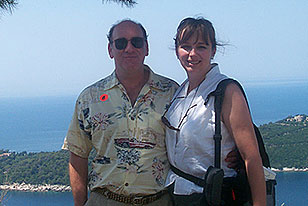Genetics and Food: Can knowledge of genomes transform agriculture?
Speaker: David Sadava, Ph.D.
In some ways, we are what we eat. Many people are concerned with what they
eat (the scientific field of nutrition). Fewer people worry about the human food supply (the
applied biology field of agriculture). Genetics and DNA have a lot to say about both of these
topics. With Dr. Sadava as your guide, get the latest on the “green revolution” in
crop production, the interaction of the human genome with foods, and the potential and risks
of genetically altered crops.
Obesity and Unhealthy Food Choices in Cultural Perspective: The French-American Contrast
Speaker: Paul Rozin, Ph.D.
Americans worry so much about their weight and try to eat low fat food, and French eat a higher
fat diet than Americans and worry less. Doesn’t that make you wonder why obesity is much
lower in France than in the USA?
Settle into a sedentary session with Dr. Rozin, and assess the determinants of food choice and
food intake. You’ll take a look at how the modern developed-world food environment is opposite
to the environment to which we are adapted, and how this leads to obesity. We’ll compare
the ways the French and Americans have adapted to the major changes in the food world, and get
the scoop on how the French have managed to be less afflicted by obesity and more engaged in
the enjoyment of eating.
The Emotion of Disgust: From Toilet to Terrorism
Speaker: Paul Rozin, Ph.D.
How did a basic food rejection mechanism designed to protect the body from toxins and disease
evolve, in cultural history, to become a reaction to all sorts of offenses, including things
like incest, murder, and cheating.
Get a clear look at the behind-the-scenes of disgust, and the factors such as the sympathetic
magical laws of contagion and similarity that shape disgust. Join Dr. Rozin for an exploration
of the meanings of disgust, and the sense in which disgust at eating worms may be the same fundamental
process as our reaction to hearing about incest or even cheating on examinations.
Lay Thinking About Risks: Hunter-Gatherer Thinking in The 21st Century
Speaker: Paul Rozin, Ph.D.
Humankind’s adaptations to our ancestral environment have equipped
us with a variety of feelings and mental shortcuts which often aid us in negotiating the modern
world. However, they are sometimes maladaptive in the rapidly evolving world that we have created.
Explore the methods humans use to determine what to eat and what to avoid, and how humans deal
with the many potential risks (e.g. nuclear power, genetic engineering) that the modern world
presents.
Psychological, Cultural, and Biological Perspectives on Some Foods: Water, Spices, Meat
and Chocolate
Speaker: Paul Rozin, Ph.D.
Why do billions of people in the world add hot chili pepper, which irritates the inner surface
of their mouth, on most of their savory foods? Would you drink pure water recycled directly from
sewage water? How do you feel about T-bone steaks? Why is chocolate irresistible? Dr. Rozin will
shed light on the answers to these questions. The biological and cultural history of these substances,
and the reactions of contemporary people from Western-developed cultures to each of these foods
are on the table in this session.














